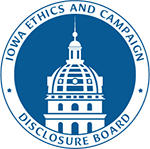1. A PAC may not be established to advocate for or against only one candidate except for a judge standing for retention (68A.202(2)). Thus PACs need to be careful when choosing a name for the committee (Citizens for Jones PAC is a bad idea) and must make sure to contribute to, or do work for, more than one candidate.
2. Candidates for state office may not establish, direct, or maintain a PAC (68A.303(5)).
3. PACs may not solicit or receive from an insurance company, savings and loan association, bank, credit union, or corporation any money, property, or thing of value belonging to any such entity for purposes of advocating for or against candidates (68A.503).
- Ballot issue PACs are NOT subject to this prohibition (68A.503(1)).
- Use of corporate facilities is permitted when reimbursement is provided (rules 351-4.44 through 4.52).
- The parent entity of a PAC that would otherwise be prohibited from providing anything of value to the PAC may pay for the administrative costs of the PAC (rule 351-4.52) including:
1. Full or partial compensation of PAC staff (wages and benefits).
2. Expenses of transportation and travel for PAC staff (does not include expenses of transportation or travel if provided to a candidate or for expenses of meals or events held on behalf of a candidate).
3. Printing and office supplies related to routine office administration.
4. Postage and stationery including mailing contributions to candidates and for providing advocacy materials to PAC members only.
5. Expenses of maintaining committee records and preparing campaign reports.
6. PAC promotional materials (pens, coffee mugs) so long as the materials do not promote candidates.
4. The parent entity of a PAC that would otherwise be prohibited from providing anything of value to the PAC may also pay for the costs of soliciting the stockholders, administrative officers, and members for contributions to the PAC (68A.503(3) and rule 351-4.52).
1. Employees who cannot be solicited may voluntarily contribute to the PAC.
2. The Ethics Board defined "member" in IECDB Advisory Opinion 2000-20 to include individuals who are authorized to vote on corporate matters pursuant to by-laws or other organizational documents.
3. In IECDB Advisory Opinion 2000-20, the Board opined that the prohibition on solicitations extended to non-supervisory personnel, clerical staff and associates.
5. PACs may not contribute to, act as an agent or intermediary for contributions to, or arrange for the making of monetary or in-kind contributions to state officeholders (both executive branch and legislators) or candidates for state office (statewide and legislative) on any day during the legislative session. The prohibition extends for an additional 30 days after session for contributions to the Governor or any gubernatorial candidate (68A.15A).
1. The prohibition does not apply if the officeholder is seeking federal office and the contribution is made to the federal campaign.
2. The prohibition does not apply to a special election held during session so long as at least two candidates have been nominated.
3. In IECDB Advisory Opinion 2001-01, the Ethics Board opined that the prohibition applied only during the "regular legislative session" and did not apply during any "special session."
6. PACs may not receive anonymous contributions in excess of $25 (68A.501). Such funds must escheat to the State of Iowa general fund.
7. Contributions shall not be made or received in the name of another person (68A.502). Campaign reports must disclose the actual name of the person who made the contribution.
1. If a PAC receives a contribution that is "earmarked" to then be given to a specific candidate or committee, the PAC is required to disclose on its campaign report the name of the contributor and the committee that the contribution has been earmarked. When transferring the money to the subsequent committee, the PAC must inform the treasurer of the recipient committee the name of the individual contributor. The committee receiving the earmarked contribution must disclose both the name of the original contributor and the PAC that forwarded the contribution (rule 351-4.33).
8. Candidates are not permitted to make contributions to PACs from campaign funds (68A.302 and 68A.303) except for the purchase of PAC fundraiser ticket and the candidate attends the event. The candidate may also pay for one guest to attend the fundraiser if the attendance of the guest would enhance the candidate's candidacy (rule 351-4.25(1)"h").
9. All PAC expenditures must be by check. Cash withdrawals and petty cash are not permitted. If PAC fundraising event requires a cash drawer for making change or other cash transactions, the PAC may issue a check payable to a PAC officer to be cashed (rule 351-4.36).
10. PACs may not use any resources or property of the government to advocate for or against candidates or ballot issues unless the governmental entity has a written policy that would allow any group (regardless of whether or not for political purposes) to use the resources or property of the governmental entity (68A.505A).
